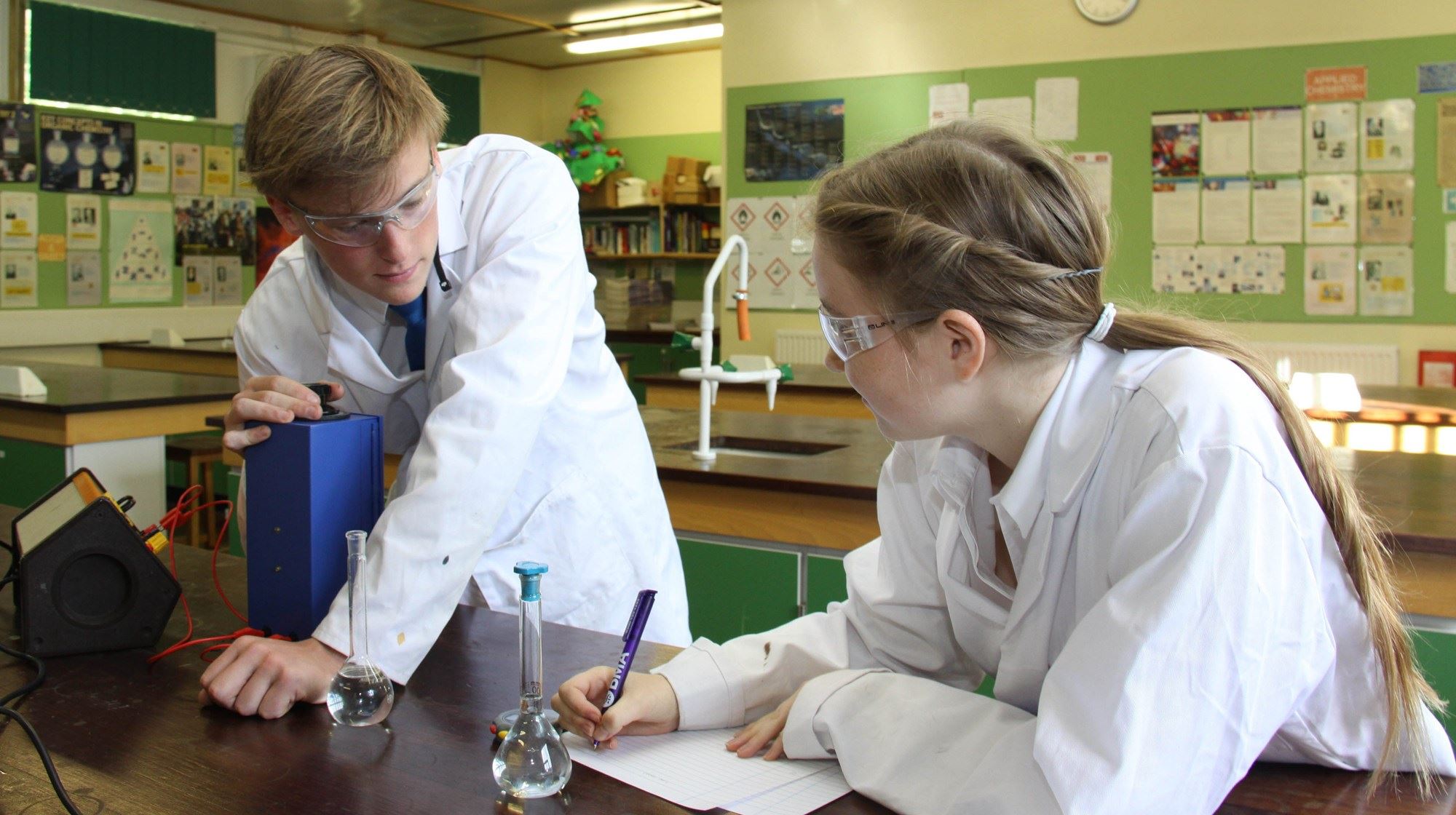Chemistry
Head of Department: Mrs J Wilson
Exam board: AQA
Qualification name: Chemistry
Qualification codes: GCE AS 7404, GCE A level 7405
What you will study
Lower Sixth
Paper 1 – Physical, Inorganic and Practical Chemistry
This module explores the fundamental principles that form the basis of chemistry. Topics include: atomic structure, amount of substance, bonding and a study of redox and equilibria.
Paper 2 – Physical, Organic and Practical Chemistry
This unit introduces more of the principles that underpin chemistry and looks at the application of these principles and those developed in Paper 1. Topics covered include: energetics, kinetics, analytical techniques and an introduction to organic functional groups such as alkenes, halogenoalkanes and alcohols.
Upper Sixth
Paper 1 – Physical, Inorganic and Practical Chemistry
This topic includes and expands upon the physical and inorganic chemistry topics covered in the Lower Sixth. Topics include: kinetics, thermodynamics and acids and bases, as well as more advanced inorganic chemistry topics such as the study of the transition metals.
Paper 2 – Physical, Organic and Practical Chemistry
This paper includes a further kinetic study as well as significantly more organic chemistry in the form of carbonyl compounds, aromatic chemistry, amine chemistry and polymers. Analytical techniques such as mass spectrometry, infra-red spectroscopy and nuclear magnetic resonance spectroscopy are studied.
How you will be assessed
Papers 1 and 2 covered in the Lower Sixth can be taken to gain AS chemistry in the Lower Sixth year.
There are two 90-minute papers (each worth 50% of AS).
A Level:
Paper 1 – one 120-minute paper (35% of A Level)
Paper 2 – one 120-minute paper (35% of A Level)
Paper 3 (synoptic paper) – one 120-minute paper (30% of A Level)
Why choose Chemistry?
The aim of the course is to encourage students to:
Develop their interest in and enthusiasm for chemistry, including developing an interest in further study and careers in the subject;
Appreciate how scientists make decisions about scientific issues and how the sciences contribute to the success of the economy and society;
Develop essential knowledge and understanding of different areas of the subject and how they relate to each other.
We focus on understanding, rather than just factual recall, and on technological applications and their social, economic, ethical and environmental implications. There is an emphasis on practical work throughout the course.
Course requirements
A level chemistry is more mathematical in content than at GCSE. It requires the ability to think and write clearly and precisely, and to use mathematics confidently. Students should have achieved at least a grade 6 in GCSE Chemistry or grade 7 in Additional Science, and at least a grade 6 in GCSE Mathematics.
Related subjects in the Sixth Form
Chemistry is often regarded as the central science. It is linked to Physics through physical chemistry, to Biology through organic chemistry and biochemistry, and to Geography through geology and geochemistry. It also fits well with Mathematics and Design Technology as a lead into engineering.
Where could this lead?
Chemistry provides a great variety of career opportunities in, for example, research, analysis, production, sales and marketing. An increasing number of Chemistry graduates find employment outside the chemical industries in the business and financial sectors due to the large numbers of transferable skills that chemistry graduates acquire. An A Level qualification in Chemistry is a pre-requisite for many vocational degrees such as medicine, dentistry, veterinary science, chemical engineering and agriculture.
Further important information
Students are expected to develop their mental and manipulative skills through the exploration of a wide variety of chemical situations and to appreciate the scientific approach to problem solving. Emphasis is placed on data analysis and on learning by experiment; practical work is a vital feature of the subject and is fully incorporated into the course.
It is an essential feature that students assume ever-increasing responsibility for their own learning. In addition to work that is set, students are expected to read around the subject using the textbooks provided and the wide range of texts in the chemistry department and the school library. Students are also encouraged to seek any help they need from staff. There is an increased emphasis on practical work and the A Level comes with a practical skills endorsement for candidates who meet the required level of proficiency.


